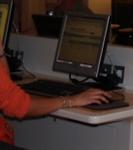
Study Freelance Writing: Write for Websites, Magazines, and More
Anyone can write, with a little help. In this course, you'll study genres, markets, and structure. You'll learn:
-
how to write what publishers want
-
to improve your professional writing skills under the guidance of a team of internationally published book, magazine and newspaper writers
-
how to optimise opportunities for "breaking in" to the writing profession as a freelance author, writer or journalist
This course is useful for a variety of different people, including:
- people starting out
- fiction writers wanting to transition
- consultants wanting to break into the press market
- people wanting to write online content or for the printed word.
- and more.
Student Comments about this course:
"I found the course to be extremely helpful. It has given me the confidence and the skills to present my work to publishers"
~ D. Bond, Freelance Writing graduate.
"The Freelance Writing course has been one of my most favourite due to the ease & flexibility of correspondence. I have found the staff always helpful and friendly. I appreciated that there were no deadlines and I could complete the work involved when I had time."
~ Janine
Freelance writing can be a highly satisfying and rewarding way to earn money, either as a part time or full time career. To be successful at Freelance Writing, you need good writing skills of course but also:
- saleable ideas
- patience
- persistence
- an ability to meet obligations and deadlines.
If this sounds like skills you have, then enrol now and develop your freelancing opportunities today!
Lesson Structure
There are 10 lessons in this course:
-
Introduction to freelancing
-
Scope of freelance writing (types of writing, where to begin, styles, etc). getting help, finding resources & contacts, understanding industry terminology.
-
Basic writing skills
-
What is communication, types of communication, types of language, clear wording, concise wording, parts of speech, grammar, punctuation.
-
The publishing world
-
Periodicals, books, remaindering, copyright, publishers advertising conditions, public lending rights, contracts, selling.
-
Manuscripts
-
Types of printing, preparing a type script, etc.
-
Planning what you write
-
Mechanics of writing, developing an idea, sentence structure, precis, planning what you write, building a paragraph.
-
Newspaper writing
-
Newspapers, regular columns, fillers, short features, etc.
-
Magazine writing
-
Travel writing, magazine articles/features, determining potentially marketable articles.
-
Writing books
-
Non fiction, fiction, short stories, determining what to write and developing an idea.
-
Writing advertising
-
Writing a press release, writing an advertisement, writing for public relations, etc.
-
Special project
-
Planning and developing a manuscript for a small book.
Aims
-
Discuss the nature and scope of freelance writing.
-
Evaluate your basic writing skills and identify deficiencies needing attention in order to
-
be successful at freelance writing.
-
Develop a concept for freelance writing which has potential for selling.
-
Identify commercial opportunities to sell writing to publishers.
-
Describe the preparation of a manuscript for submission to a publisher
-
Write commercially viable items for publishing in a newspaper.
-
Write commercially viable items for publishing in a magazine.
-
Plan for production of a commercially viable book manuscript.
-
Write commercially viable advertising.
-
Apply all skills and knowledge so far developed to the production of a complete manuscript.

TAKE THE NEXT STEP AND ENROL NOW!
There is a high demand for skilful freelance writers. Whether you want to work in education, publishing, scriptwriting, copywriting, marketing or many other careers, or work for yourself, this course will provide you with detailed knowledge on how to improve your writing skills.
Improve your writing career!
Save
